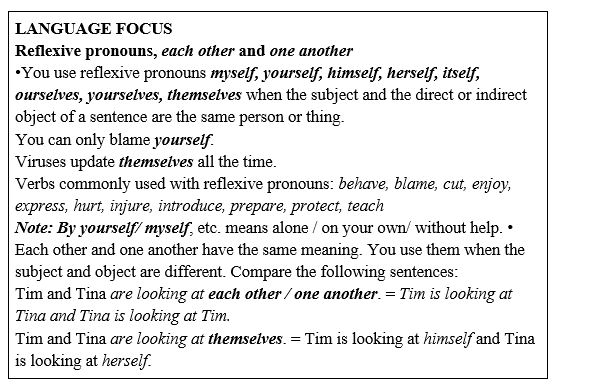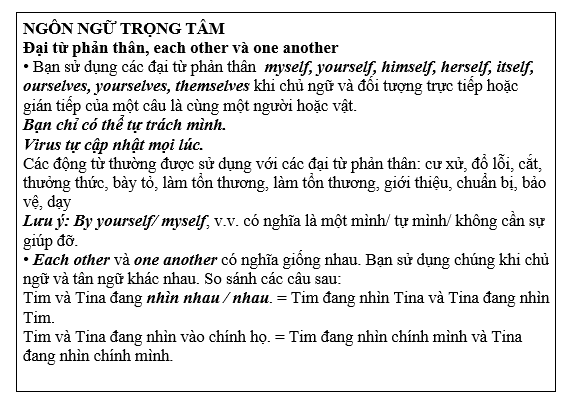Tiếng Anh 11 Unit 9 9.6 Use of English1(9.09) The words and phrases in the box are from a podcast. Discuss what you think the podcast is about. Then listen and check your ideas. 2(9.10) Replace the underlined pronouns with appropriate words and phrases in Exercise 1. Then listen again and check. 3. Read the LANGUAGE FOCUS and underline all the examples of reflexive pronouns and each other / one another in Exercise 2. Quảng cáo
Lựa chọn câu để xem lời giải nhanh hơn
Bài 1 Reflexive pronouns (Đại từ phản thân) I can correctly use each other and reflexive pronouns. (Tôi có thể sử dụng each other và đại từ phản thân một cách chính xác.) 1(9.09) The words and phrases in the box are from a podcast. Discuss what you think the podcast is about. Then listen and check your ideas. (Các từ và cụm từ trong hộp là từ một podcast. Thảo luận về những gì bạn nghĩ podcast nói về. Sau đó lắng nghe và kiểm tra ý tưởng của bạn.) anti-virus software digital footprint identity thieves passwords a weak password a password manager videos and photos viruses Giải nghĩa: anti- virus software: phần mềm chống vi rút identity thieves: kẻ trộm danh tính a weak password: mật khẩu yếu videos and photos: video và ảnh digital footprint: dấu chân kỹ thuật số (dấu vết người dùng để lại khi sử dụng Internet) passwords: mật khẩu a password manager: trình quản lý mật khẩu virus: vi rút Lời giải chi tiết: I think a podcast is about ways to secure personal information on the Internet. (Tôi nghĩ podcast là về cách bảo mật thông tin cá nhân trên Internet.) Bài 2 2(9.10) Replace the underlined pronouns with appropriate words and phrases in Exercise 1. Then listen again and check. (Thay thế các đại từ được gạch chân bằng các từ và cụm từ thích hợp trong Bài tập 1. Sau đó nghe lại và kiểm tra.) 1. If you use one of these, you can only blame yourself if a hacker gets into your account. 2. You can use one of these to save yourself some trouble. 3. Keep them to yourself. Even with your friends, don't tell one another. 4. Use this to protect yourself from viruses. 5. They update themselves all the time, so you need to update your software too. 6. If you send each other these, they're likely to stay online for a long time. Lời giải chi tiết: 1. If you use a weak password, you can only blame yourself if a hacker gets into your account. (Nếu bạn sử dụng mật khẩu yếu, bạn chỉ có thể tự trách mình nếu hacker xâm nhập được vào tài khoản của bạn.) 2. You can use a password manager to save yourself some trouble. (Bạn có thể sử dụng trình quản lý mật khẩu để tránh rắc rối cho mình.) 3. Keep passwords to yourself. Even with your friends, don't tell one another. (Giữ mật khẩu cho chính mình. Ngay cả với bạn bè của bạn, đừng nói với nhau.) 4. Use anti- virus software to protect yourself from viruses. (Sử dụng phần mềm chống vi-rút để bảo vệ bạn khỏi vi-rút.) 5. Viruses update themselves all the time, so you need to update your software too. (Virus tự cập nhật mọi lúc, vì vậy bạn cũng cần cập nhật phần mềm của mình.) 6. If you send each other video and photos, they're likely to stay online for a long time. (Nếu bạn gửi cho nhau video và ảnh, chúng có thể sẽ ở lại trực tuyến trong một thời gian dài.) Bài 3 3. Read the LANGUAGE FOCUS and underline all the examples of reflexive pronouns and each other / one another in Exercise 2. (Đọc phần NGÔN NGỮ TRỌNG TÂM và gạch dưới tất cả các ví dụ về đại từ phản thân và each other / one other trong Bài tập 2.)
Tạm dịch:
Bài 4 4. Complete the questions with each other/ one another or themselves. Then ask and answer the questions with a partner. (Hoàn thành các câu hỏi với each other/one another hoặc với themselves. Sau đó hỏi và trả lời các câu hỏi với một đối tác.) 1. How often do you and your friends message each other? 2. How well can your parents express ________ in English? 3. What do you and your friends normally talk to ________ about? 4. How do your friends protect ________ from spam? 5. How long have you and your best friend known ________ ? 6. What do your classmates do to prepare ________ for exams? Lời giải chi tiết: 1. How often do you and your friends message each other? (Bạn và bạn bè của bạn có thường xuyên nhắn tin cho nhau không?) 2. How well can your parents express each other in English? (Bố mẹ bạn có thể diễn đạt với nhau bằng tiếng Anh tốt đến mức nào?) 3. What do you and your friends normally talk to each other about? (Bạn và bạn bè của bạn thường nói chuyện với nhau về điều gì?) 4. How do your friends protect themselves from spam? (Bạn bè của bạn tự bảo vệ mình khỏi thư rác như thế nào?) 5. How long have you and your best friend known each other? (Bạn và bạn thân của bạn quen nhau được bao lâu rồi?) 6. What do your classmates do to prepare themselves for exams? (Các bạn cùng lớp của bạn làm gì để chuẩn bị cho kỳ thi?)
|






















Danh sách bình luận